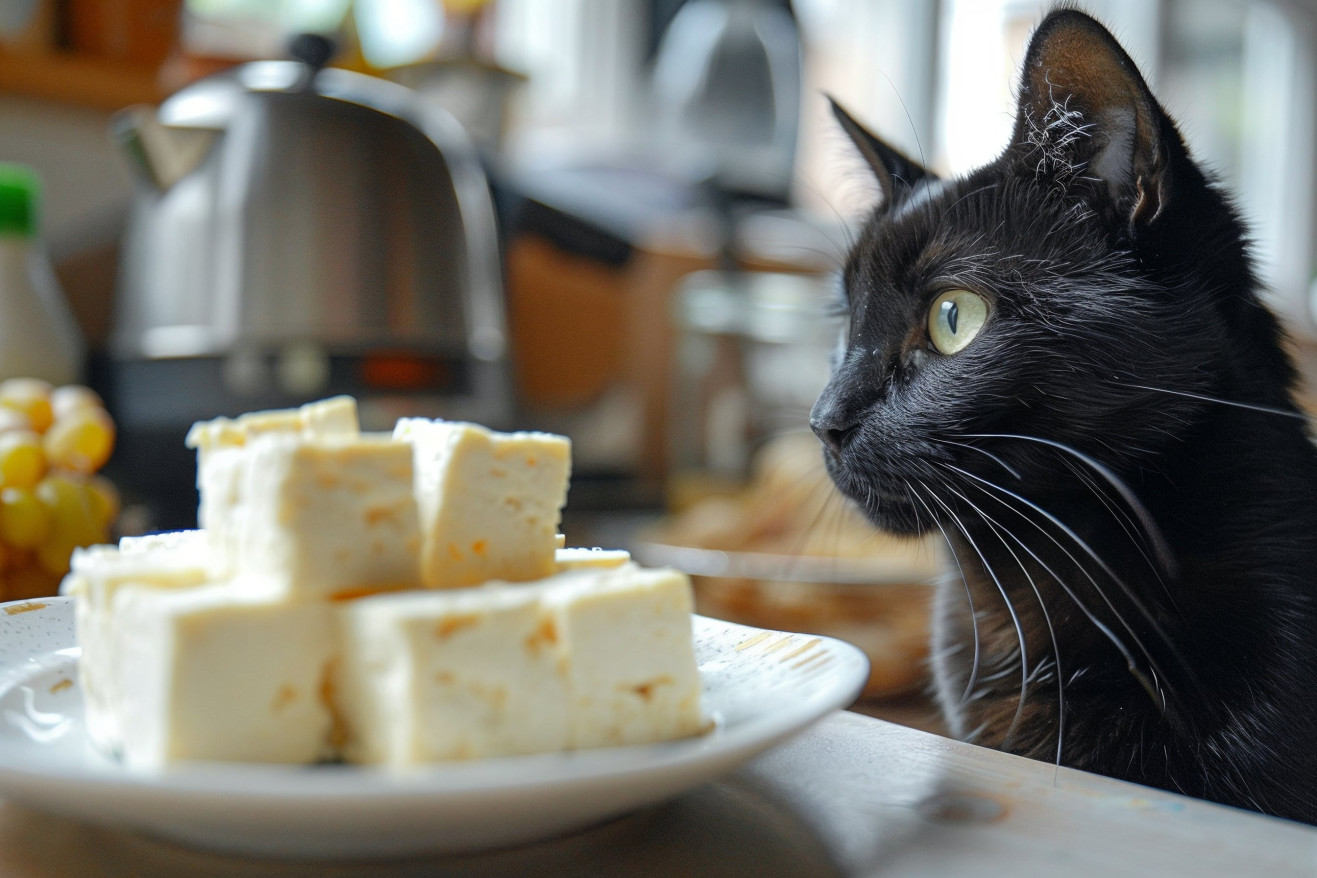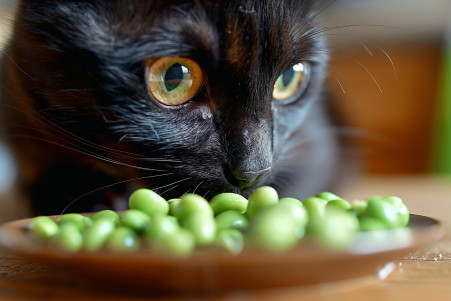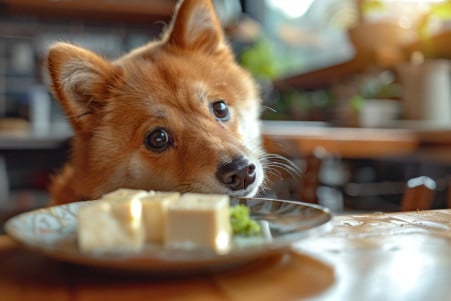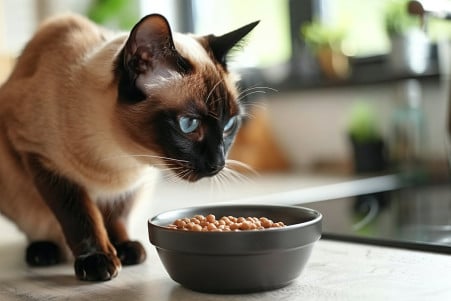Can Cats Eat Tofu? Exploring Plant-Based Foods for Felines
24 April 2024 • Updated 22 April 2024

Tofu is a great source of protein for people, but can cats eat tofu, or should they just stick to their regular meat-based diet? Tofu is not the best option for cats because they are obligate carnivores and need animal-based proteins to make sure they get all the amino acids and other nutrients they need. While some cats may be able to eat small amounts of tofu without any problems, it's not a good idea to feed them a lot of it because it's made from plants and doesn't contain all of the essential nutrients cats need.
In this article, we'll look at what the experts, including veterinarians and feline nutritionists, have to say about the topic, including the nutritional content of tofu and how well it meets the dietary needs of cats. We'll also talk about the nutrients that cats need that are only found in animal proteins and how to feed your cat a small amount of plant-based food like tofu as a treat while still making sure they get the balanced, carnivorous diet they need.
Can cats eat tofu?
Cats as Obligate Carnivores: A Look at Their Nutritional Requirements
Cats are obligate carnivores, which means they have evolved to need a diet that is primarily made up of animal-based proteins and fats. Unlike omnivores, such as humans, cats do not have the enzymes needed to properly digest and absorb nutrients from plant-based foods. Their bodies are designed to best use the nutrients found in animal tissues.
For example, cats can't synthesize the amino acids taurine and arginine on their own, so they must get them from their diet. Taurine is important for vision, heart health, and reproduction, while arginine is important for the urea cycle and other metabolic functions. A lack of these amino acids can lead to issues like blindness, heart disease, and reproductive problems.
In addition, cats need higher levels of certain vitamins, such as niacin and vitamin D3, than other animals. These vitamins are often found in plant-based foods, but they are not in a form that cats can easily absorb. This means that cats are more likely to become deficient in these vitamins if they are fed a vegetarian or vegan diet. Not meeting a cat's specific nutritional requirements can lead to serious health problems.
The Benefits and Risks of Feeding Cats Tofu and Soy-Based Products
Tofu is not poisonous to cats, but it does not contain the complete protein profile that cats need as obligate carnivores. Catster explains that cats need animal-based proteins to get the essential amino acids, including taurine and arginine, that their bodies need. Cats can also have trouble digesting the plant-based proteins and sugars in soy, so eating a lot of tofu can cause digestive problems like diarrhea in cats.
In addition, Catster says that soy-based products can contain substances that can impact a cat's health, including a substance that may contribute to hyperthyroidism, which is a common endocrine disease in cats. Some cats are also allergic to soy and can develop symptoms like itching, vomiting, and skin problems.
Even though small amounts of tofu are unlikely to cause problems and can be used as an occasional treat, VCA Animal Hospitals warns that tofu should not be used to replace a cat's regular meat-based diet. Cats have specific dietary requirements that are best met by high-quality commercial cat foods that are specifically formulated to provide the right mix of proteins, fats, and other nutrients.
Nutritional Content: Commercial Cat Foods vs. Homemade Diets
Commercial cat foods are formulated to provide the nutritional balance that cats require. According to the Feline Health Center at Cornell University, this means they contain the right proportions of proteins, fats, carbohydrates, vitamins, and minerals that cats need. PetMD notes that cats need a diet that is high in animal-based protein, low in fat, and low in carbohydrates to be healthy.
On the other hand, homemade cat food diets can be difficult to balance and may not provide all the nutrients that cats need. The Blue Cross even warns that cats can't be vegan or vegetarian because they need nutrients like taurine, which is only found in animal-based proteins. As a result, veterinarians typically recommend feeding cats a high-quality, AAFCO-approved commercial cat food to ensure that they get all the nutrients they need.
Although some plant-based or vegan cat foods may offer synthetic versions of these nutrients, there's no evidence about their long-term effectiveness or how well they're absorbed by cats. As a result, the best way to make sure that your cat gets the nutrients they need is to make sure that they eat a balanced diet that includes meat.
Adding In Healthy Treats: Human Foods That Are Safe for Cats
While a healthy cat diet should be made up mostly of high-quality cat food, there are some human foods that can be used as healthy treats for cats. Purina lists some examples of safe treats as cooked lean meats, oily fish like tuna, cooked eggs, and small amounts of certain fruits and vegetables like sweet potato, pumpkin, and blueberries.
However, cats should be kept away from foods that are toxic or difficult for them to digest, such as onions, garlic, chocolate, and raw meat. The Honest Kitchen warns that these human foods can lead to serious health problems for cats. Treats should make up no more than 10% of a cat's daily calorie intake and should be introduced gradually so that you can watch for any negative side effects.
If you want to add human food treats to your cat's diet, it's a good idea to talk to your vet first. They can give you personalized advice and make sure that the treats you're considering are safe and appropriate for your cat based on their health and nutritional needs.
Conclusion: Meeting a Cat's Nutritional Needs as an Obligate Carnivore
The studies on soy isoflavone metabolism in cats show that cats metabolize these compounds differently than other animals. A study published in the PMC journal demonstrated that cats have a much lower capacity for glucuronidation of soy isoflavones such as genistein and daidzein than dogs and other species, suggesting that cats use alternative metabolic pathways like sulfation to a greater extent to metabolize these compounds.
Moreover, a recent study published in PLOS ONE calls into question the long-held belief that cats should not be fed vegan or vegetarian diets. The researchers found no evidence of negative health effects in cats fed a plant-based diet and even suggested that a vegan diet may have some health-promoting effects in cats.
That said, earlier research has shown that cats fed vegan diets can develop severe nutritional deficiencies, especially in essential amino acids. Meeting these nutritional requirements through supplementation would require a level of knowledge about feline nutrition that most pet owners don't possess.
In the end, while some cats may be able to do well on a vegan diet that's been carefully formulated to meet their nutritional needs, the research suggests that cats are best served by a diet that's based on meat and that's in line with their status as obligate carnivores. This makes it especially important to work with a veterinarian to make sure a cat's nutritional needs are being met.


